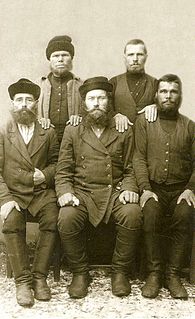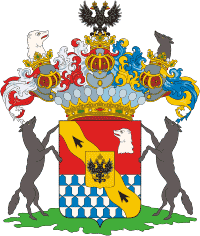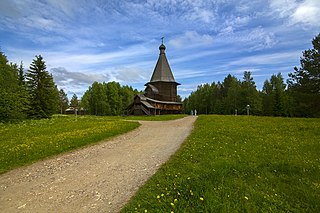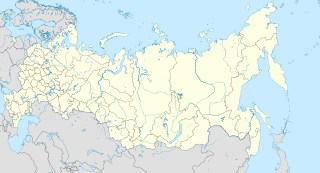Biography
Shergin grew up in the Pomor culture in the family of a shipmaster. The life of the family was closely connected with the city of Arkhangelsk and the White Sea. His stories are written in the Pomor dialect.

Pomors or Pomory are Russian settlers, primarily from Novgorod, and their descendants living on the White Sea coasts and the territory whose southern border lies on a watershed which separates the White Sea river basin from the basins of rivers that flow south.

The White Sea is a southern inlet of the Barents Sea located on the northwest coast of Russia. It is surrounded by Karelia to the west, the Kola Peninsula to the north, and the Kanin Peninsula to the northeast. The whole of the White Sea is under Russian sovereignty and considered to be part of the internal waters of Russia. Administratively, it is divided between Arkhangelsk and Murmansk Oblasts and the Republic of Karelia.

Pomor dialects are a group of Northern Russian dialects widespread among the Pomors of the former Arkhangelsk Governorate and northern parts of the Olonets and Vologda Governorates.
From 1903 to 1912 Boris studied in Classical School of Archangelsk Province and after finishing it went to Moscow to study at the Stroganov’s Artistic-Industrial High School.
His first stories were published in 1915. In 1916 on the initiative of A.A.Shakmatov the Academy of Sciences commissioned Boris Shergin to Shenkursky District of Arkhangelsk Province to research local dialects and collect folklore pieces.
In 1917 upon graduating from the Stroganov’s School he returned to Arkhangelsk to work in the local Society for Studies of the Russian North and later in arts and crafts workshops. He made a major contribution into revival of northern handicrafts. Shergin was also into archaeography: he collected antique books, poetry albums, songbooks, old sailing directions, and skippers’ notebooks.
In 1922 Boris Viktorovich moved back to Moscow to work for Children’s Reading Institute under People’s Comissariat for Education. The year 1924 saw the publication of his first book - U Arkhangelskogo goroda, u korabelnogo pristanisha with his own illustrations.
The beauty of the Russian north, with its proud people and rich culture, is reflected in his books.
After 1946 Akhmatova-Zoshchenko issue Shergin underwent persecutions as "spoiler of the Russian language".
Some of his stories were adapted into films, such as the animated films The Magic Ring (1979) and Laughter and Grief by the White Sea (1987).
The year 1979 in film involved many significant events.

Laughter and Grief by the White Sea is a 1987 Soviet traditionally animated feature film directed by Leonid Nosyrev made at the Soyuzmultfilm studio. The film is a celebration of the culture of the Russian Pomors who live around the White Sea.
The following is an overview of events in 1987 in film, including the highest-grossing films, award ceremonies and festivals, a list of films released and notable deaths. Paramount Pictures celebrated its 75th anniversary in 1987.

Arkhangelsk Oblast is a federal subject of Russia. It includes the Arctic archipelagos of Franz Josef Land and Novaya Zemlya, as well as the Solovetsky Islands in the White Sea. Arkhangelsk Oblast also has administrative jurisdiction over Nenets Autonomous Okrug. Including Nenetsia, Arkhangelsk Oblast has an area of 587,400 km2. Its population was 1,227,626 as of the 2010 Census.

Bjarmaland was a territory mentioned in Norse sagas since the Viking Age and in geographical accounts until the 16th century. The term is usually seen to have referred to the southern shores of the White Sea and the basin of the Northern Dvina River as well as, presumably, some of the surrounding areas. Today, those territories comprise a part of the Arkhangelsk Oblast of Russia.

The northern Russian dialects make up one of the main groups of the Russian dialects.

The Stroganovs or Strogonovs, referred to in French as Stroganoffs, were a family of highly successful Russian merchants, industrialists, landowners, and statesmen. From the reign of Ivan the Terrible in the 16th century they were the richest businessmen in the Tsardom of Russia. They financed the Russian conquest of Siberia and Prince Pozharsky's reconquest of Moscow from the Poles. The Stroganov School of icon-painting takes its name from them. The most recent common ancestor of the family was Fyodor Lukich Stroganov, a salt industrialist. His elder son, Vladimir, became the founder of the lineage that degraded to state peasants; this lineage is still continued. The lineage from his youngest son, Anikey, died out in 1923. Anikey's descendants had made it to the high Russian nobility under the first Romanovs.
Count Sergei Grigoryevich Stroganov was a Russian statesman, art historian, archaeologist, collector, and philanthropist. He was a member of the highly successful and prominent Stroganov family

Pomor trade, is the trade carried out between the Pomors of Northwest Russia and the people along the coast of Northern Norway, as far south as Bodø. The trade went on from 1740 until the Russian revolution in 1917.

The Onega Peninsula is located in Arkhangelsk Oblast, Russia. It protrudes into the White Sea, with Onega Bay to the south-west, and Dvina Bay to the north-east. The length of the peninsula is about 150 kilometres (93 mi), and the width varies between 60 kilometres (37 mi) and 75 kilometres (47 mi).

Bird of Happiness is the traditional North Russian wooden toy, carved in the shape of a bird. It was invented by Pomors, the inhabitants of the coasts of the White and Barents Seas. The Bird of Happiness is made without glue or other fasteners, by carving thin petals for the bird's wings and tail and then using a special method of spreading and curving them, also found in other products of the North Russian handicraft. The amulet is usually made of pine, fir, spruce, or Siberian cedar. It is suspended inside a house, guarding the family hearth and well-being.
Mikhail Suprun Михаил Николаевич Супрун is a Russian historian and professor of the Pomor State University named after M. V. Lomonosov. In 2009 he was arrested in connection with a book he wrote on what Open Democracy has called a "trumped up charge".

Yuri Viktorovich Kara, born on 12 November 1954 in Stalino, is a Russian film director, screenwriter and producer.

Onezhsky District is an administrative district (raion), one of the twenty-one in Arkhangelsk Oblast, Russia. As a municipal division, it is incorporated as Onezhsky Municipal District. It is located in the northwest of the oblast and borders with Primorsky District in the northeast, Plesetsky District in the southeast, Pudozhsky, Medvezhyegorsky, and Segezhsky Districts of the Republic of Karelia in the southwest, and with Belomorsky District of the Republic of Karelia in the west. In the north, the district is washed by the White Sea. The area of the district is 23,740 square kilometers (9,170 sq mi). Its administrative center is the town of Onega. Population: 14,017 (2010 Census); 16,791 (2002 Census); 22,269 (1989 Census).

Primorsky District is an administrative district (raion), one of the twenty-one in Arkhangelsk Oblast, Russia. As a municipal division, it is incorporated as Primorsky Municipal District, and also includes Solovetsky Islands in the White Sea and Franz Josef Land and Victoria Island in the Arctic Ocean. It is located in the north of the oblast and borders with Mezensky District in the northeast, Pinezhsky District in the east, Kholmogorsky District in the southeast, Plesetsky District in the south, and with Onezhsky District in the south. From the north, the district is washed by the White Sea. The area of the district is 46,100 square kilometers (17,800 sq mi). Its administrative center is the city of Arkhangelsk. Population: 25,466 (2010 Census); 29,365 (2002 Census); 31,813 (1989 Census).

Boris Stepanovich Lukoshkov was a Russian artist. He was an Honoured Artist of the RSFSR.

Vladimir Vladimirovich Lichutin is a Soviet Russian writer, a major proponent of the derevenschiki movement of the late 20th century literature, best known for his Raskol (1990-1996) epic. Most of Lichutin's novels and novelets are based on the life of real people of the coastal White Sea areas of his native Pomorje region.
Yury Iosifovich Koval was a Russian author, artist, and screenplay writer.

Brín-Navolok is a town in northern Russia, located in the Arkhangelsk region. It is the namesake of the Brin-Navolok municipality, as well as its administrative and geographical centre.


















